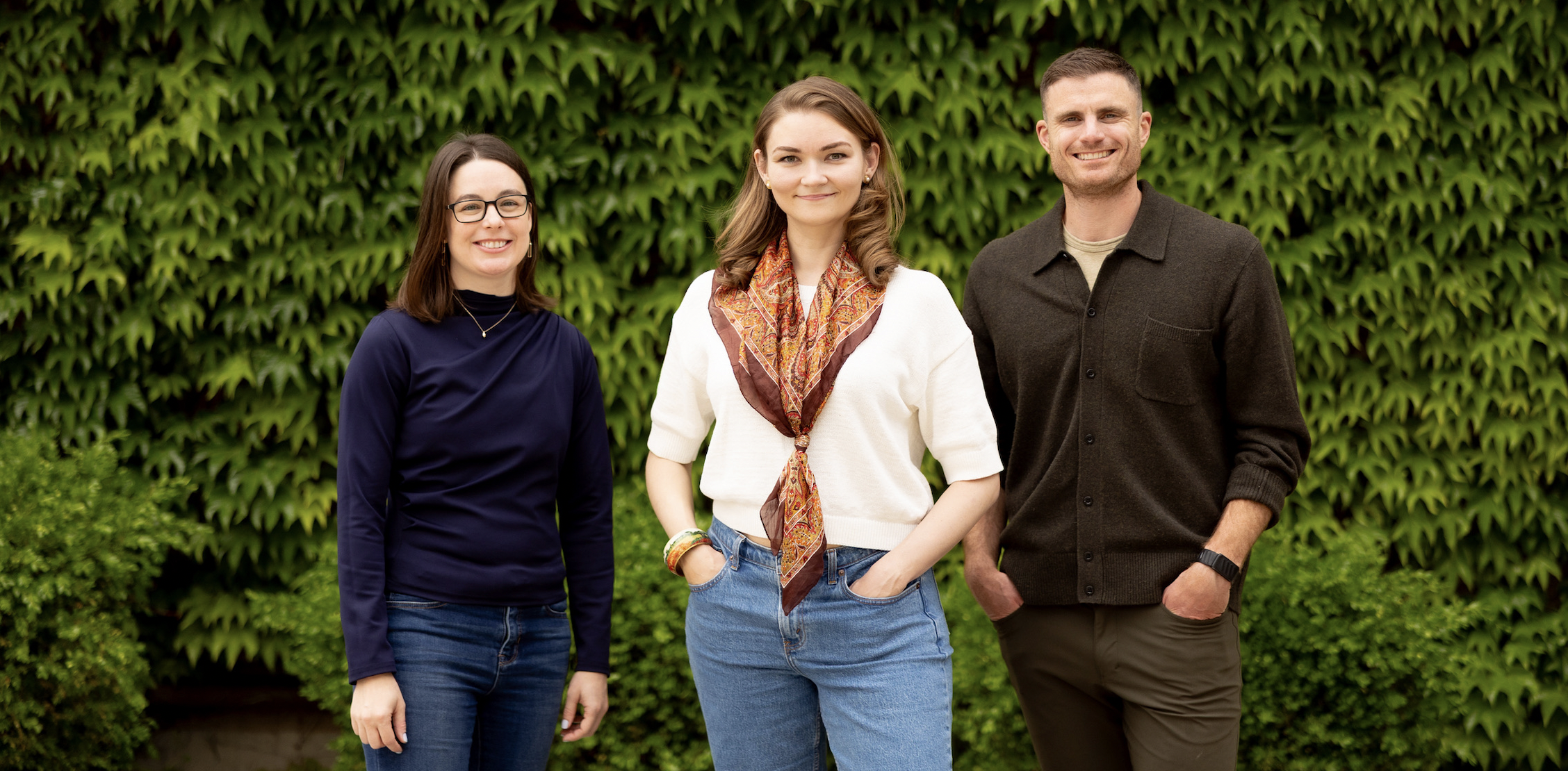We Asked a Psychologist How to Stay Sane in the AI Bubble
Caitlyn Driehorst is a financial advisor at RightWise Wealth, as well as the firm's founder and CEO. Caitlyn began her career at the Boston Consulting Group and held strategy roles at MGM Resorts, Capital Group American Funds and two venture-backed wealth startups. She holds a B.A. from the University of Chicago and an M.B.A. from UC Berkeley's Haas School of Business.
Published: November 14, 2025
What’s going to happen with the markets and our economy?
There’s good reasons to think the market’s all-time highs could slip away, expanding job losses: “circular financing” in the AI economy, uncertain long-term impact of tariffs, increasing loan defaults in lower income groups, geopolitical instability.
But there’s also good reasons to think the market could continue to grow: AI advances are (today) creating real revenues, interest rates have come down and may continue to do so, and our administration prioritizes economic outcomes.
To understand how our clients should think about investing in this climate of uncertainty, I reached out to Dr. Kara Christensen Pacella, a clinical psychologist and professor of psychology at the University of Nevada, Las Vegas.
How does a therapist – with a decade of training in research-backed techniques to help people understand their emotions – think about market volatility, risk and market uncertainty?
Heads up, this blog post is ~2,200 words or ~ten minutes for the average reader. However, we loved Kara’s insights on peace during turmoil; money and marriage; risk and personality; and her go-to first suggestion when someone says they feel unhappy. So, we’ve decided not to abridge her comments.
Dr. Christensen Pacella, welcome!
Tell me about your professional background.
Thanks for having me! I earned my Ph.D. in clinical psychology from The Ohio State University, after a one-year clinical residency at Medical University of South Carolina. Then, I completed a three-year postdoctoral fellowship at the University of Kansas. In 2022, I joined the faculty of the University of Nevada in Las Vegas as an Assistant Professor of Psychology. These days, I primarily conduct clinical research and provide instruction. I also train students and interns to become therapists.
You also were my roommate for all four years at UChicago, starting in 2007, and we’ve been close friends ever since.
That’s right. We’ve attended multiple Beyonce concerts together.
Understanding your emotions as information
At RightWise, it’s our job to talk with clients when they have questions and concerns about the market and the economy. When clinical patients bring those types of concerns to you, how do you approach those conversations?
Often, we’re talking about emotions. What is an emotion? An emotion is a signal about your environment. “Anger” might be a signal that your rights are being infringed upon. “Anxiety” might be a signal that there’s uncertainty and apprehension about a future outcome for which we feel we should prepare ourselves.
With my clients, I always start by validating their emotions. Emotions are normal, everyone has them, and they can provide important information. The last thing I want is someone to blame themselves for just having an emotion. We don’t have a lot of control over the initial experience of an emotion or how intensely we feel it.
But next, I want to push people to understand, “Is this emotion being fueled by the correct interpretation of the situation?” Feeling something doesn’t mean it’s true. I can be very anxious about something that has no chance of happening. I might be mad because I assumed someone said something sarcastic over text message, but that wasn’t their intention at all. We want to make sure that if our emotion is driven by thoughts that aren’t accurate, we adjust our thinking to align with the true threat or the facts.
Well, and that’s one thing that’s challenging about emotions related to the economy and the stock market: no one knows what’s going to happen, so you can’t have perfect information for your choices.
Yes, and that brings us to my final push on emotions. You want to ask, “Is this emotion useful?” Sometimes, an emotion is useful. It can motivate you to take actions towards a goal, or to stay committed even though something is hard, or to show up in a way that’s consistent with your values.
But sometimes, emotions aren’t useful, and they can lead us to actions that take us away from our goals.
When people have concerns about the economy – which, right now, feel inextricable from concerns about the political environment – sometimes I wonder if money feels like a way that they can take action. Like you may feel powerless about democracy or immigration raids, but you can take action by shuffling your investments. The challenge, of course, is that behavior can harm your financial outcomes.
In my field, we’d call this “negative urgency,” which is an impulse to take action when you have a strong negative feeling to try and make the anxiety or distress go away. It’s tricky for us as therapists to treat because it’s self-reinforcing: “I felt angry about this, I took this action, now I feel better.” You feel better because you took action, but was that action truly helpful to you? Was that thing that you were anxious about ever going to happen?
When I see this in patients, I try to help them understand what their worries truly are, and then to assign probabilities to those concerns. Is this something that will definitely, probably, maybe or probably not happen? When people are anxious, they often expect that improbable things are more likely to happen and that the consequences will be worse than they actually are. On top of that, they often feel like they’re not going to be able to handle these bad outcomes, even though none of that may be accurate.
Folie à Deux
The back of my head at Kara’s Las Vegas ceremony. Fun fact, I passed CFA Level 2 that morning. Photo credit Rose Rashid.
I like to joke that being a financial advisor means also being a bit of a virtual assistant and also a bit of a couples counselor. Helping two people align their money is one of our most important and trickiest responsibilities. How do you approach couples who have different instincts about money?
Ha! Here I can speak from personal experience: my husband and I have different backgrounds and experiences with regards to money, so any joint decisions about our finances take some conversation.
Oh, my marriage, too. Maybe all married people have to work for consensus on money.
When I’m talking to couples, I always want to start by helping them find common ground in the big picture. What’s the life that we’re building together? What’s our shared vision?
Then, where they have disagreements, I want to dig into what’s motivating those emotions. Is it a pattern from childhood? Is it a worry or fear? Is it a fact pattern that hasn’t been shared? The path forward can vary depending on the motivation.
And then finally, relationships are all about compromise. Where I see couples resisting compromise, I want to dig into what feels uncomfortable about a specific proposed compromise: is it fear of a potential outcome? Is it resentment?
Is risk tolerance a personality trait?
Simplifying a common practice to its worst case, it’s always bothered me that financial advisors may give new clients a “risk tolerance questionnaire” – a personality test about how they feel about seeking gains versus avoiding losses – and then if that one little Buzzfeed-esque quiz suggests that a client doesn’t actively enjoy losing money, the advisor should invest their funds conservatively.
I get frustrated because these abstract multiple-choice exercises don’t reflect my client’s actual comfort with risk – especially my female clients. These quizzes are traditionally administered separate from education or context for market movements, but in my experience, most women are comfortable with risk, they just don’t want risk they don’t understand. And I think that’s reasonable!
This industry practice seems built on the idea that risk tolerance is an inherent, immutable trait, independent of information. How do you see risk preferences as personality traits versus responses to environment?
Attitudes towards risk absolutely have elements of personality: neuroticism, impulsivity, reward-seeking. These are traits that vary from person to person and would affect willingness to take risks.
That said, I agree with you that evaluating attitudes towards risk also requires us to consider the knowledge someone has about the risk they’re taking. Think about it this way: suppose we’re camping and you tell me you’re worried about bears. Let’s say I then pull out a guidebook and show you that bears aren’t indigenous to this area and this campsite has never had a bear sighting. If you tell me you’re still nervous about bears, I’d ascribe that to personality.
Finally, attitudes towards risk are also informed by lived experience, especially childhood experiences. We have this concept in psychology of “delay discounting” – to what degree do you value one dollar today over more dollars at a later date? In general, having lower delay discounting, or being willing to wait for the greater reward, is associated with greater self-control and better physical and mental health.
But it’s not actually that simple. People who have experienced food scarcity, improper care, generally not being able to rely on promises or institutions will have a stronger preference towards the sure-thing now, and that’s completely reasonable in their context. If your experiences tell you that future rewards are uncertain, of course you would want the guaranteed outcome.
How do you find peace with decisions when you can’t know the future?
We love working with people who have stock compensation such as RSUs, and we have to guide them in making decisions that have significant ambiguity and also potentially large financial outcomes. “If I sell this stock, how will I feel if I later find out it shot right up and I missed out? How will I feel if I hold this stock and it craters down?” I’d love to hear how you talk with clients about making significant decisions when we can’t have perfect information.
I always want my clients to distinguish between “goals” and “values.” Goals can be achieved: you can run a race, you can buy a house. But values can never be achieved: you can’t check the box on “honesty” or “curiosity.” Instead, you can live your life in a way that’s consistent with that which you value.
We live in a culture that’s often more about goals than values, and that contributes to unhappiness. If you chase goals and rack up wins, but still find yourself unfulfilled, it might be because your achievements are not actually things you value. By contrast, your life may have few external markers of “success,” but you could feel very happy because your day-to-day life is aligned to your values. When people are unhappy, I ask them to start to take an action every day – even a little one – consistent with a value, and see how that makes them feel.
So when you’re faced with a challenging decision, I’d start by defining your values, and thinking about what actions are consistent with your values. Because ultimately, that’s what you can live with.
I’d also encourage your clients to realize how frequently they make decisions in the face of ambiguity and don’t think twice. That’s actually most decisions. Every time you get into a car, you may not come home. You choose a vacation to one country over another, and you may be present for a natural disaster or just enjoy a fantastic time at the beach. We live every day with so much ambiguity. Hindsight is 20/20 and we don’t as often think about the decisions we got “right” as much as beat ourselves up over the ones we got “wrong.” Be gentle with yourself; we can only do the best that we can with the information that we have at the time.
Finally, a lot of happiness is being aware of our advantages and feeling gratitude. What a privilege to have the option to make choices based on values and thoughtful consideration! Many people have to make decisions based on just the resources they need to live. So I’d encourage gratitude, even where there’s anxiety.
Hamming it up at UChicago’s art museum during graduation week, June 2011
You’ve been one of my closest friends for almost twenty years. What’s one thing you think someone ought to know about me, if they’re considering working with my firm?
Loyalty. When I think of you, the first thing I think of is how hardcore you are about personal loyalty. I remember in college, you’d heard that this guy said something nasty about one of us girls, and even after you learned the story had been told to you wrong, you still didn’t really like that guy, because you still felt he was the kind of person who could have said something unkind. And you just won't have that for the people you care about. I’m guessing you carry that ride-or-die through to your clients.
And we’re talking about values – for you, “doing the right thing” has always been a value. You’ve always been uncomfortable in environments where you don’t think people’s actions are honest. I think starting your own company where you could match its particulars to your conscience was a values-aligned move for you.
Kara, that’s so nice. I thought you would maybe bring up the fact that I showed up to college with like six different Enya CDs burned on the iTunes of my white plastic Macbook.
I wouldn’t bring up your many, many Enya albums. I would bring up those ridiculous puffy snow boots you brought; they looked like the Michelin man. We gave you so much crap, I don’t think you ever wore them. But you know what, they were probably really warm. We wore such impractical shoes back then, for the Chicago winter. Lots of stiletto boots.
We’re now in our mid-late 30s, this is our era for pragmatic footwear.
A new chapter.
If someone wanted to work with you as a therapist, what should they know?
My main gig is as a clinical researcher focused on eating behaviors and sleep; however, I do have a small private practice where I use evidence-based treatments for people who want to improve their sleep. If you have challenges falling asleep, staying asleep, not feeling rested, we have some amazing non-medication treatments that can improve your sleep in as few as six to eight sessions. It may sound trivial but that can lead to meaningful improvements for people’s anxiety, function and happiness – sleep can be an input to a well-regulated life, not just an output. Despite how effective our treatments are, many people don’t know they exist!
I also work with people, especially women, who generally feel anxious and are interested in research-backed techniques to manage stress. These days, there’s a lot of concerns about our country and political system, and I find it so fulfilling to help people find a way to function and feel good in their day-to-day, even as headlines can feel overwhelming.
You can read more about Dr. Kara Christensen Pacella at www.thrivesleepclinic.com and set up a complimentary discovery session to learn about her private practice at https://calendly.com/kara-christensen-pacella/new-client-informational-call. Dr. Christensen Pacella is licensed to accept clients via telehealth in Nevada and 42 other U.S. states.
Ready to talk to a financial advisor?
We’d love to talk about your thoughts and feelings about investing. Reach out to request a complimentary discovery meeting.














